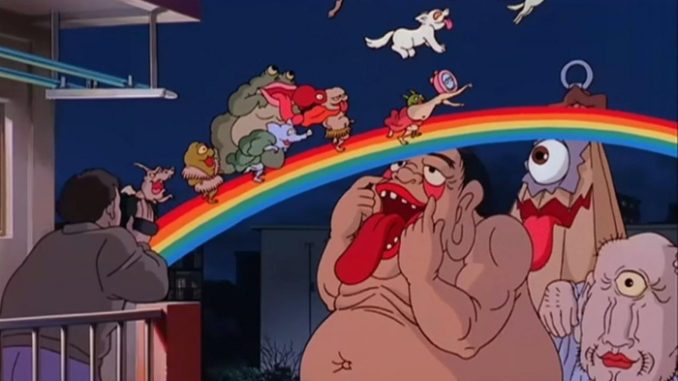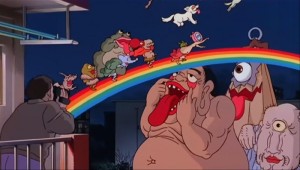
Kate Koenig, Editor-in-Chief
Do you know about Miyazaki films? Maybe you remember “My Neighbor Totoro” or “Kiki’s Delivery Service” from the early 90s. Some of the more popularly known titles also include “Princess Mononoke,” “Howl’s Moving Castle” and “Spirited Away.” These movies come from a Japanese production company known as Studio Ghibli, which was co-founded in 1985 by directors Hayao Miyazaki and Isao Takahata.
Watching the movies of Studio Ghibli is like traveling through a realm beyond our universe. While Takahata’s productions usually take much inspiration from Japanese folklore or history (“Pom Poko,” “Grave of the Fireflies”), Miyazaki’s creations seem to be inspired by any wide stretch of his imagination.
Take “Spirited Away,” for example. The movie begins with a young girl who’s suddenly and without warning transported into the spirit world, after she sees her parents transformed into pigs. She’s alone, surrounded by strange and bizarre creatures and for some reason can’t remember her name. Characters include three green grunting heads that stack on top of each other, a giant baby, a boy that transforms into a dragon, and a creature by the name of No-Face. No-Face is an unidentifiable spirit who has a mask for a face, and eventually mutates into a voracious beast that conjures up gold pieces to lure creatures closer in order to swallow them whole. However, when he escapes from the central spirit bathhouse, he returns to “normal.”
The works of Takahata are usually more based on realism. His directing work under Studio Ghibli is encompassed by “Grave of the Fireflies” (1988), “Only Yesterday” (1991), “Pom Poko” (1994) and “My Neighbors the Yamadas” (1999). “Grave of the Fireflies” tells the story of two siblings fighting for survival in the final months of World War II; “Only Yesterday” follows a female protagonist who spends time working on a farm and reflecting on her life’s memories.
“Pom Poko,” which draws heavily on Japanese folklore, is based on the myth that raccoons are shape-shifters who use energy from their testicles to transform. And there’s not just a bit of this in the movie, either. If you sit down to watch “Pom Poko,” you’ll be seeing hairy raccoon testicles from the beginning to the end. It’s filled with what seems like pure comedy to Americans, but is defined by its typical Japanese elements; there’s more to it than the uncomfortable amount of cartoon genitalia. In one extended scene, the shape-shifting animals put on a phantasmagoric parade in town to scare the local humans, and many of outlandish creatures from the scene were inspired by stories from Japanese mythology. Every scene that involves their transformations displays completely alien, and in that sense, fascinating, visuals.
Each movie produced by Studio Ghibli is a unique experience. The quality of animation is comparable to the early Disney animated features, specifically the artwork from “Snow White and the Seven Dwarves,” “Pinocchio” and “Fantasia.” Each story is an almost ineffable piece of fantasy (with the exception of the more realistic plots). The visuals will leave permanent imprints on your mind. Not to mention the music, composed by Joe Hisaishi, which, by listening, may be the best method of transporting yourself to the worlds of the movies when you want to revisit them without taking the time to re-watch them.
Okay, so clearly I’m a huge fan of Miyazaki and Studio Ghibli. If you haven’t already, you might go and watch “Pom Poko” and walk away without much of an impression. You might catch an airing of “Spirited Away” and simply roll your eyes at the sight. But honestly, I doubt it.
Miyazaki’s son Gorō Miyazaki has also been directing, with his latest release being “From Up on Poppy Hill” just last year. I recommend the classics, but feel free to start with the latest and move backwards; either way you’ll be experiencing a world far beyond the usual.
Leave a Reply